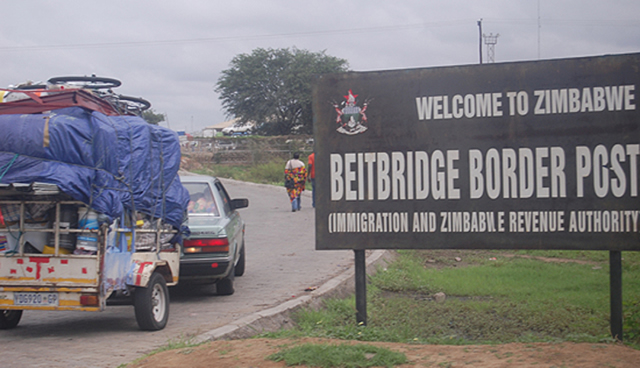Time to sort out rot at Beitbridge Border Post

 Munashe Maunda Correspondent
Munashe Maunda Correspondent
Chronic delays at arguably the busiest inland port of entry in sub-Saharan African, Beitbridge, which became particularly manifest during the just-ended Easter holiday when north-bound traffic from South Africa increased markedly, have led to calls for a permanent solution to the problem.
Beitbridge Border Post handles more than 3 500 vehicles and 9 000 people daily with the numbers soaring to 25 000 during peak periods such as Easter and Christmas holidays.
Its strategic importance to the regional road transport system cannot be overemphasised as it is the gateway to Zambia, Malawi and the Democratic Republic of Congo which heavily rely on South Africa for national supplies.
Conservative estimates show that the port of entry collects at least $60 million in revenue monthly, accounting for 70 percent Zimra’s income which also translates to 30 percent of Government’s revenue.
Zimbabwe has 15 ports of entry which are being run by Zimra, however, the borders remain porous while travellers are faced with numerous challenges that include artificial delays in service by corrupt officials.
Apart from corruption, Beitbridge Border Post is dogged by a shortage of staff, with only 248 Zimra officials working at the port which requires about 336 people.
A tourist wishing to drive from South Africa to Victoria Falls via the Beitbridge border should brace for a wait of up to four hours for customs and immigration clearance on a busy day and such frustrating experiences can negatively impact on tourism and potential revenue.
Several countries across the world have attempted to address the issue of delays in the clearance of human and commercial traffic by creating quasi-Government port authorities to assist State agencies in the running of ports of entry.
In some cases, private companies have been roped in to assist the Government in running ports of entry resulting in increased efficiency without compromising security.
For example, in 2006, the United States government awarded port management contracts at six of its major seaports to United Arab Emirates-based company Dubai Ports World (DPW).
Although this sparked controversy on whether such a sale would not compromise port security, the deal was approved by the executive branch of the US government with the then President George W. Bush arguing vigorously that it was a step in the right direction.
Local analysts and businesspeople have proposed the setting up of a fully resourced authority in Zimbabwe to increase efficiency at busy ports of entry such as Beitbridge and Chirundu where truck drivers can spend up to three days before being cleared to cross the borders.
The proposal comes as the Zimra Commissioner-General Gershem Pasi pleaded for Government to shelve the idea of establishing such a ports authority apparently for fear of losing revenue.
Such fears could, however, be misplaced as Zimra is constitutionally mandated to collect customs duty on any goods that are imported into the country on behalf of the Government. A ports authority would merely deal with administrative bottlenecks affecting people who must not be delayed unnecessarily at ports of entry.
The establishment of a ports authority is being pushed by Transport Minister Obert Mpofu who some say should focus his energies on reviving the parastatals under his ambit than overburden himself with creating another company.
Internationally, a port authority is a government or quasi-government public authority formed by a legislative body to operate ports and other transportation infrastructure and is financially self-sustaining.
Mr Pasi argues, perhaps not objectively, that a ports authority would not be able to support itself for many years after its inception because of fiscal challenges.
Local business lobby groups such as the Cross-Border Traders’ Association of Zimbabwe, the Zimbabwe National Chamber of Commerce and the Confederation of Zimbabwe Industries have repeatedly appealed to authorities to address challenges at ports of entry to facilitate the smooth flow of business which is critical to the revival of the economy.
The onus is on policymakers to consider options such as the ports authority to facilitate trade and commerce as the country gears for the successful implementation of the Zimbabwe Agenda for Sustainable Socio-Economic Transformation (Zim-Asset).
Despite the increase, the arrivals are yet to reach the peak of 2,2 million tourists recorded in 1999.
The majority of 2013 arrivals were low-spending tourists from mainland Africa who came in at 1 570 799.
An independent study by the South African Institute of International Affairs (Saiia) showed that 400 trucks pass through the Beitbridge border everyday however they are often delayed by up to three days.
Saiia said that each delay which sets back the truck driver by $400 also translates into an increase in the price of the transported goods.
“Given that Beitbridge Border Post is the busiest regional transit link in Eastern and Southern Africa, the fact that most of SA’s road freight to countries to the north is bottlenecked into a single lane is a critical issue,” the study revealed.
The study also noted that crime is also rife at the border as transporters often bribe corrupt officials to get the necessary documentation.
“Government officials often hold the private sector to ransom by refusing to let trucks undergo the necessary procedures unless a bribe is paid,” Saiia said.
A report compiled by the African Development Bank (AfDB) notes that Zimbabwe’s poor infrastructure is slowing down economic growth in the country.
The report titled “Infrastructure and Growth in Zimbabwe: An Action Plan for Strengthened Recovery” states that the deterioration in infrastructure stemmed from inadequate routine maintenance.
“Infrastructure services in road transport and communications that are provided by the private sector are now more expensive than in neighbouring countries, reflecting in part the economic costs of the deterioration,” added the AfDB.
According to the Infrastructure Development Bank of Zimbabwe’s infrastructure director Mr Desmond Matete, the country needs about $33 billion to upgrade and maintain the existing infrastructure in the next 10 years.
He noted that $11,3 billion will go towards electricity, $6,5 billion to information communication technology (ICT), $1,8 billion to water and larger chunk towards transport.
“To realise this goal we need to dedicate $1,65 billion per annum, transport and energy are the key economic enablers and we should look for solutions to address them because they assist in the promotion of trade, innovation, social cohesion and eradication of social isolation,” he added.
Local business lobby groups such as the Cross Border Traders Association of Zimbabwe, the Zimbabwe Chamber of Commerce and the Confederation of Zimbabwe Industries have repeatedly appealed to authorities to address challenges at ports of entry to facilitate the smooth flow of business which is critical to the revival of the economy.
The onus is on policymakers to consider options such as the ports authority to facilitate trade and commerce as the country gears for the successful implementation of the Zimbabwe Agenda for Sustainable Socio Economic Transformation (ZimAsset).









Comments